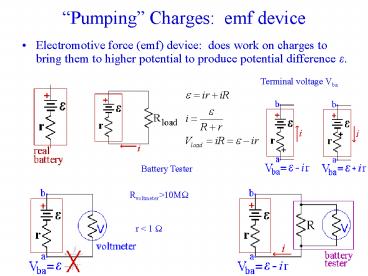- PowerPoint PPT Presentation
1 / 7
Title:
Description:
Electromotive force (emf) device: does work on charges to bring them to higher ... Generators/alternator: most influential emf device. Amplitude: Vm. Vrms=Vm ... – PowerPoint PPT presentation
Number of Views:24
Avg rating:3.0/5.0
Title:
1
Pumping Charges emf device
- Electromotive force (emf) device does work on
charges to bring them to higher potential to
produce potential difference ?.
Battery Tester
Rvoltmetergt10M?
r lt 1 ?
2
AC and House Wiring
- Generators/alternator most influential emf
device
Amplitude Vm VrmsVm/sqrt(2)120V Vm160V
Power distribution system
3
Example Simple circuit
A student built circuit as shown in the figure to
power a electric circuit that requires 3V power
input. The internal resistance of the circuit is
R50 W. The student used R1100 W and R2300 W.
He found the circuit did not function properly.
How would you solve the problem by modifying the
circuit
Without R
With R
For example R15 W, R215 W, V12.8V
4
Kirchhoffs Voltage Law (KVL)
The algebraic sum of potential difference in a
loop must be zero
- Draw current direction (arbitrary) and label the
voltage direction (determined by the define
current direction.
2. Define either clockwise or counterclockwise
direction as positive voltage direction. Once the
direction is defined, you have to use the same
convention in every loop. (the sign for the
voltage cross a resistor if current direction
is the same as the loop direction, - other wise)
-eVrV1V20
- Apply KVL V if V is in the same direction
defined above.
eVrV1V2 I(rR1R2) I e/ (rR1R2)
5
Kirchhoffs Voltage Law multiloop
The algebraic sum of potential difference in a
loop must be zero
- Draw current direction (arbitrary) and label the
voltage direction (determined by the define
current direction.
- Define either clockwise or counterclockwise
direction as positive voltage direction. Once the
direction is defined, you have to use the same
convention in every loop.
- Apply KVL V if V is in the same direction
defined above.
-eVrV1V20 -V2V30
eIrIR1I2R2 -V2V30
6
Kirchhoffs Current Law (KCL)
The algebraic sum of current at a node must be
zero IinIout
eIrIR1I2R2 (2) V3-V20
(3)
II2I3 (1)
e3 V, r1 W, R13 W, R25 W, R310 W I - I2
- I3 0 (4) 4I 5I2 0I3 3 (5) 0I
5I210I3 0 (6)
7
Last note on KVL KCL
If solutions to currents or voltages are
negative, they mean the real directions are
opposite to what you have defined!































